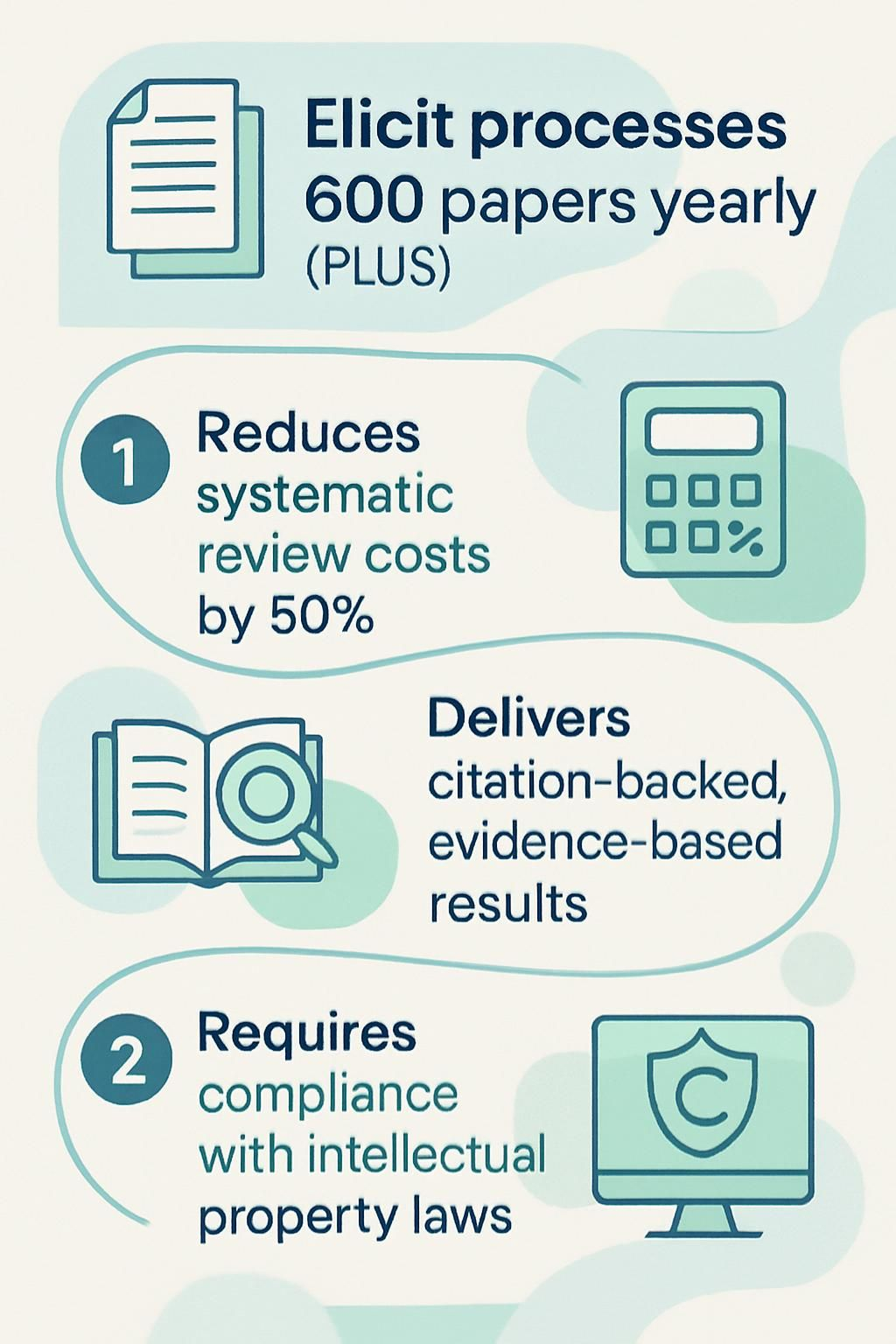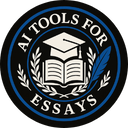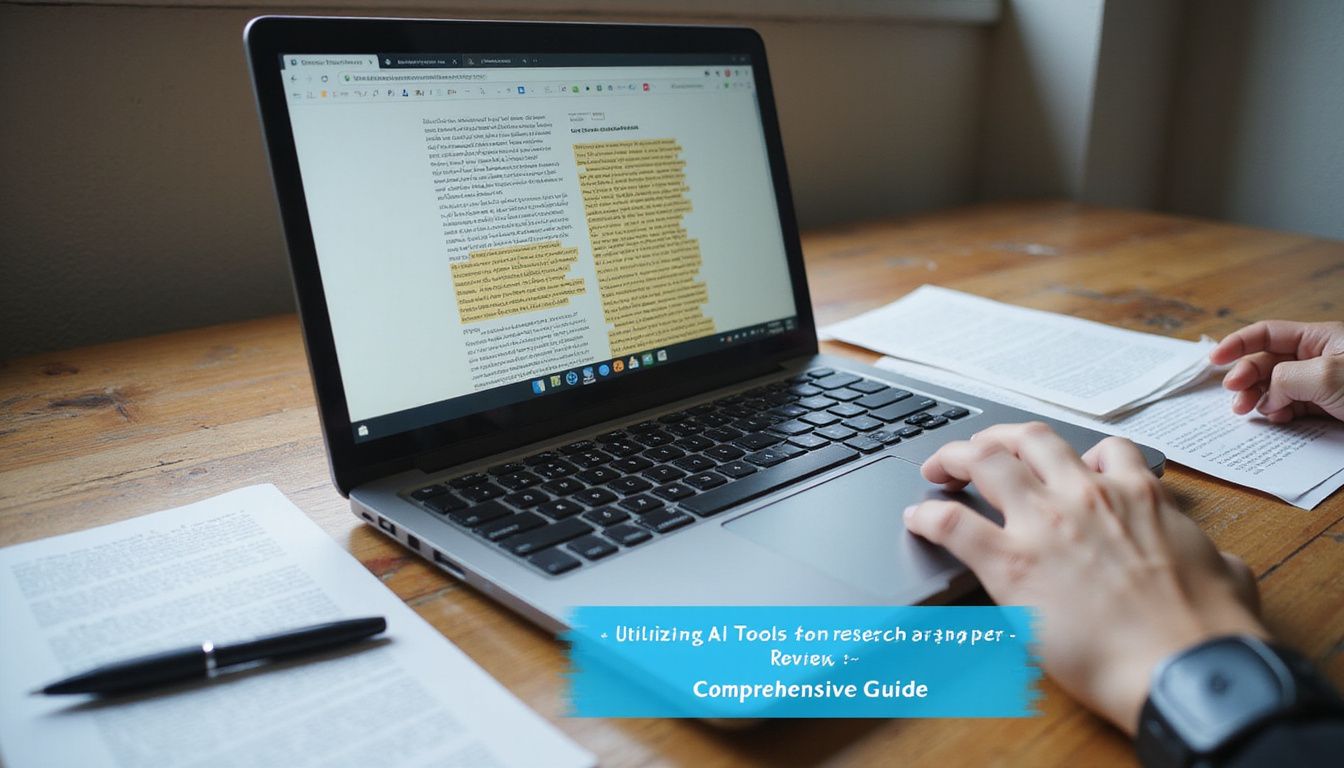Struggling with reviewing long research papers? AI tools for research paper review can save you time and effort. These tools help summarize, track citations, and organize data easily.
Keep reading to learn how they can change your research process!
Key Takeaways
- AI tools like Elicit and Paperpal help researchers save time by summarizing papers, tracking citations, and automating tasks.
- Elicit extracts data from up to 600 papers yearly with its PLUS plan and reduces systematic review costs by 50%.
- Tools improve accuracy by uncovering missed findings. They focus on citation-backed results for reliable insights.
- Privacy is crucial when using AI tools. Users must ensure platforms follow proper intellectual property laws.
- Popular tools like Consensus deliver evidence-based answers quickly, improving efficiency in academic research searches.

Key Features of AI Tools for Research Paper Review
AI tools help researchers save time by automating tedious tasks. They offer smart features to improve the paper review process.
Quick Summarization of Papers
AI tools can save hours by summarizing research papers quickly. For example, Paper Digest’s AI Reader scans PDFs and delivers instant answers. It also updates daily on impactful studies from various fields.
Elicit goes further by extracting key insights, such as findings on improving resting heart rate, in minutes.
These tools highlight main points without losing detail. Researchers can focus on critical data instead of reading multiple pages. With machine learning models and natural language processing (NLP), they spot trends across academic papers efficiently.
This boosts research accuracy and speeds up systematic reviews.
Elicit extracts table data from hundreds of papers within minutes.
Automated Screening and Data Extraction
Elicit speeds up screening tasks for researchers. It creates criteria to judge which papers fit a study’s needs. This tool extracts data from up to 600 research papers yearly under its PLUS plan.
The BASIC plan handles 20 papers per month, ideal for smaller projects or personal use.
Researchers save time and money with Elicit. Pilot tests showed a 50% drop in costs and effort during systematic literature reviews. Automated extraction helps focus on deeper analysis instead of sorting through thousands of articles.
Next, explore popular tools like Paperpal and Consensus that support academic work further!
Citation and Source Tracking
Citation tracking ensures accurate referencing in academic research. Tools like Elicit provide sources for every generated answer, helping users verify information easily. Paper Digest offers customizable features to refine searches by author, time range, document type, and more.
This makes finding trusted scholarly articles faster.
AI improves citation management through clear organization and reliable tracking. Features from tools like these simplify managing citation metrics or bibliographies while maintaining academic accuracy.
Such platforms enhance research efficiency without compromising integrity or privacy of uploaded papers.
Popular AI Tools for Research Paper Review
AI tools make reviewing research papers faster and smarter. They offer unique features to simplify your tasks and boost effectiveness.
Elicit
Elicit is a user-friendly research platform that simplifies academic paper reviews. It uses machine learning to help researchers find, analyze, and summarize data more efficiently.
With automated tools for citation tracking and extracting key information, it improves research accuracy. Elicit makes literature reviews easier by saving time on tedious tasks.
Its pricing plans are flexible. The PLUS plan costs $10/month annually or $12/month monthly. For advanced users, the PRO plan runs at $42/month annually or $49/month monthly. The TEAM plan charges $65/user/month annually or $79/user monthly, while the ENTERPRISE plan offers custom options.
Next up is Paperpal!
Paperpal
Paperpal uses artificial intelligence to make research reviews easier. It helps check grammar, spelling, and punctuation in academic papers. The tool ensures the writing style matches formal academic standards.
Researchers can also use it for plagiarism detection, reducing risks of copied content.
This platform supports citation tracking and keeps references accurate. Its machine learning features analyze data quickly to provide clear feedback on content quality. Many researchers like it because it saves time and boosts efficiency without much effort.
Consensus
Consensus uses machine learning to review research papers. It simplifies academic searches by providing direct answers from studies. Users can input questions, and the tool scans for relevant data in seconds.
This reduces time spent on traditional search engines like Google Scholar or Semantic Scholar.
The AI focuses on evidence-based results, ensuring high research accuracy. It helps track trending topics, making it a valuable platform for meta-analysis and qualitative research.
Researchers can use Consensus for tasks like citation tracking and analyzing placebo-controlled trials efficiently.
Benefits of Using AI Tools in Research Review
AI tools make research faster, clearer, and more organized—keep reading to see how they can transform your work!
Enhanced Speed and Efficiency
Tools like Elicit speed up literature reviews. They can extract data from hundreds of research papers in minutes. Users save time by accessing concise summaries quickly. For systematic reviews, Elicit reduces research time by up to 80%.
Its TEAM plan lets a user handle about 3,600 papers every year.
These tools improve research efficiency with automated screening and keyword tracking. Paper Digest updates daily on topics, authors, or keywords. Researchers no longer need to manually sift through piles of academic papers or track citations step-by-step.
Improved Accuracy and Insights
AI tools like Elicit deliver better accuracy by summarizing systematic reviews. Users can customize steps to fit their research needs. Unlike traditional search engines, it uncovers missed findings, boosting the quality of academic papers.
Its precision makes it more reliable than ChatGPT for interpreting complex evidence.
Paper Digest focuses on citation-backed results instead of large language models. This ensures trustworthy insights without bias. Such tools enhance research accuracy in quantitative studies and critical thinking tasks.
They also simplify analytical work in social sciences and data analysis projects involving machine learning or artificial intelligence methods.
Simplified Citation Management
Elicit makes citation tracking easy. It lets users see the sources for every generated answer. This helps researchers ensure accuracy in their academic papers. Elicit’s AI Writer also assists with writing and editing citations, saving time.
Tools like Paperpal focus on precise citation management too. They reduce errors while handling references in literature reviews or quantitative research studies. These tools make managing references faster and less stressful for researchers working with large-scale data or academic documents.
Ethical Considerations When Using AI Tools
AI tools can sometimes introduce bias. They rely on the data they are trained on, which may include errors or incomplete information. This can affect research accuracy and lead to misleading results.
For example, a poorly designed machine learning model might favor specific patterns while ignoring others.
Privacy issues also matter in academic work. Tools that analyze research data might access sensitive or unpublished papers without consent. Users must verify that AI platforms follow proper privacy standards and respect intellectual property laws.
Transparency about how these systems function is key to ethical use in literature reviews and statistical analysis tasks like predictive analytics or coding projects.
How AI Tools Assist in Research Paper Search
Tools like Elicit and Paper Digest make finding research papers faster. Elicit allows searches across 125 million academic papers using full texts or abstracts, offering a huge range of information.
Their BASIC plan provides unlimited searches, helping users explore vast amounts of data without restriction. Paper Digest uses an advanced knowledge graph updated in real-time to identify relevant studies quickly.
This tool also delivers daily updates on impactful papers, keeping researchers informed about the latest findings across different fields.
AI tools use machine intelligence and pattern recognition to improve search accuracy. They analyze keywords or phrases from your query to deliver exact matches or related suggestions in seconds.
For example, these platforms can locate newer papers on topics like cardiovascular health or multimedia by scanning current databases swiftly. Researchers no longer waste hours manually sifting through sources.
These features boost efficiency for tasks such as citation tracking and scholarly reviews, ensuring smooth progress toward the next stage—reviewing key insights from selected materials!
Conclusion
AI tools are changing how we review research papers. They save time, boost accuracy, and simplify tough tasks like citation management. Popular options like Elicit and Paperpal make reviews faster and more efficient.
By using these tools wisely, researchers can focus more on their ideas than the process itself. The future of academic work feels smarter with AI by your side!


Leave a Reply